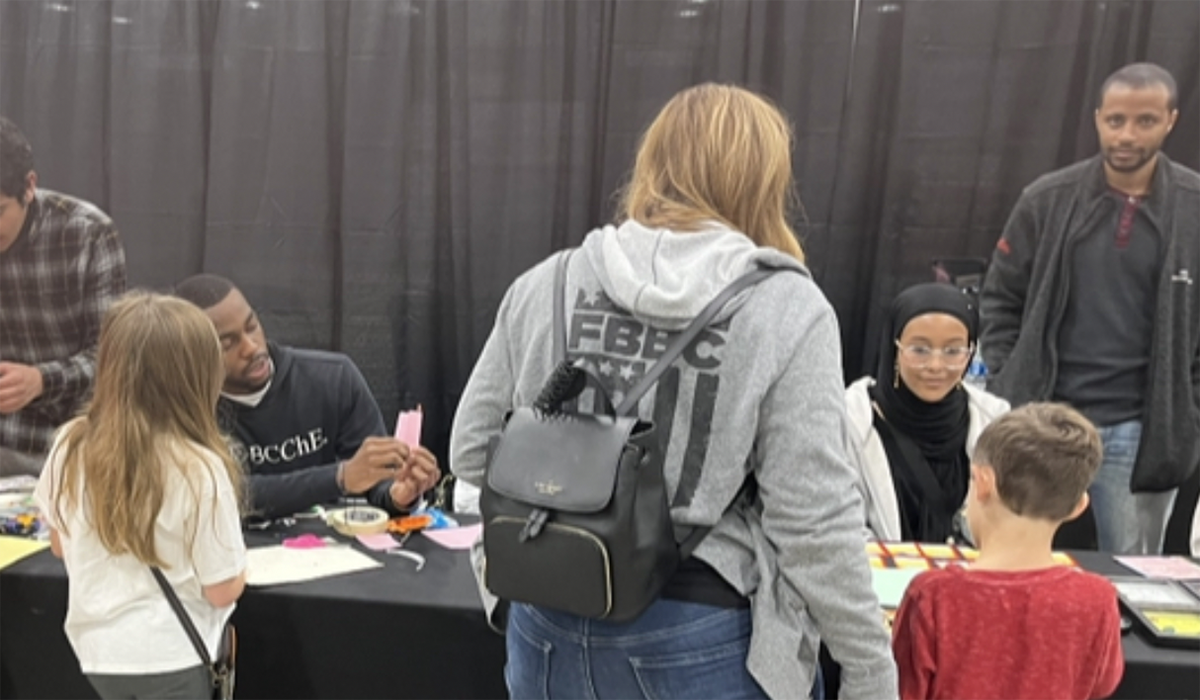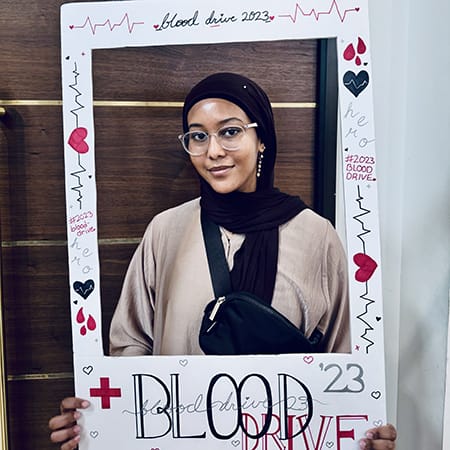Meet the High Schooler Spearheading a Youth-Led Movement Against Substance Abuse Stigma

Meet Daily Point of Light Award honoree Ashwak Kalil. Read her story, and nominate an outstanding volunteer or family as a Daily Point of Light.
In the heart of Indiana, high school student Ashwak Kalil is reshaping the narrative around youth substance abuse. Through her nonprofit, Folded Hope, Ashwak has crafted a unique and powerful approach to combat this critical issue. Her journey and the work of Folded Hope stand as a testament to the transformative power of youth-led initiatives and the impact they can have on a community.
Ashwak founded Folded Hope with a clear vision: to address substance abuse holistically and effectively. Since her first year of high school, she has been at the forefront of developing multifaceted strategies in collaboration with addiction clinics and prominent nonprofits in Indiana. Folded Hope’s approach is comprehensive, tailoring workshops for children and teenagers from ages 5-18, and encompasses everything from prevention to recovery.
One of Folded Hope’s key strengths is its ability to engage deeply with the community.
Ashwak’s commitment to understanding and sharing real-life stories of those battling addiction sets her organization apart. These efforts culminate in impactful workshops and community events, which Ashwak leads with the support of an average of 20 volunteers, drawing in about 100 participants each time.
Her involvement in a substance abuse awareness group with Indianapolis Mayor Joe Hogsett underscores her influence in policy discussions. Through monthly meetings, she informs the mayor about the challenges youths face regarding substance abuse. Her discussions with The Office of Public Health about school districts further highlight her commitment to creating sustainable change.
Read more about Ashwak’s inspiring story of spreading hope for those struggling with addiciton.

Tell us about your volunteer role.
Two years ago, in my freshman year of high school, I founded Folded Hope, which is a youth-led initiative aimed at raising awareness about substance abuse and addiction in underrepresented communities. Through our workshops, we’ve been able to reach and impact so many participants as well as getting parents involved.
I started Folded Hope because I recognized the need for open conversation about substance abuse, especially in communities like mine where it’s often considered a taboo and sensitive topic. I believe that raising awareness is key to addressing the issue, breaking down stigmas and fostering understanding and support overall.
Why is this organization and issue so important to you?
I’ve seen so many people affected by this issue in my community. Most of it is privately handled, unspoken about. Many families will say they won’t talk about it, with a “we’ll deal with it on our own” stance. Of course, that’s unhealthy. So, I think breaking down those stigmas and encouraging conversations about it, and then providing support systems for those affected contributes to a healthier and more informed community.
What are some of the initiatives your organization has led to combat the issue?
Just three weeks ago, we partnered with numerous addiction clinics, as well as the Discovery Café. This is a place for young people, ages 12 to 17, who may be facing mental health issues, substance abuse or other challenges. In the Discovery Café, youth can join their peers for a wide range of activities that provide fun and inclusive support for everyone’s wellbeing. My work mostly centers around the youth, and the Discovery Café is something I really look forward to.
What are your long-term plans or goals for the organization?
I see Folded Hope as an initiative that will continue to evolve and make a positive impact in my community. While I’m currently a junior in high school, my vision for the future involves taking Folded Hope with me into college. I believe that by continuing it, I can not only deepen my own understanding around the complexities of substance abuse, but also expand our reach and impact.
I hope to learn more, collaborate with other like-minded individuals and explore innovative ways to bring awareness to underrepresented communities. Ultimately, my goal is to contribute to a society where discussions around substance abuse are not only destigmatized but met with empathy and support.
What’s been the most rewarding part of your work?
Honestly, just seeing young kids, around ages 9 and 10, get involved. One of the most memorable moments for me personally was during a workshop, having the opportunity to talk with this young girl. Discovering how passionate she was about rocks – which seems really random – but the fact that she could hold a 30- or 40-minute conversation about it really inspired me. She shared stories about going to exhibits across the U.S., including one of the biggest exhibits in the country, as well as her collection. Each rock holds a unique significance to her.
I was truly inspired by her enthusiasm and fearlessness in expressing her passion. It reminded me of the power that genuine passion holds, and how it can bring people together, transcending the boundaries of age and background.
Why is it important for people, especially youth, to get involved with the causes they care about?
Obviously, the future is the youth – especially my generation. It’s hard seeing youth not getting civically engaged with activities like voting or volunteering. They often don’t really care about it. I think that involving youth and making sure their voices are heard is one of the most important things for our future.
Any advice for people who want to start volunteering?
Stay true to what you’re truly passionate about – highlighting impact. What do you envision for the future? Connect with your audience. Try to find out what your community is specifically struggling with and how you can help combat that. Stay open to learning, encourage inclusivity and inspire others – who may be older or younger than you.
What do you want people to learn?
I want them to learn that coming from a very small community in the state of Indiana – I can say don’t worry about others trying to take you down or those who don’t see meaning in your initiative. If you see meaning in your own initiative, you’ll surely make an impact on the right people.
Do you want to make a difference in your community like Ashwak? Find local volunteer opportunities.
